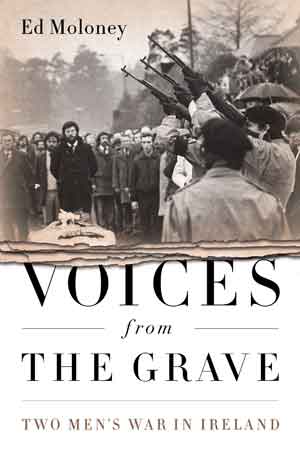 “Voices from the Grave: Two Men’s War in Ireland” by Ed Moloney. PublicAffairs (New York, 2010). 544 pp., $19.95.
“Voices from the Grave: Two Men’s War in Ireland” by Ed Moloney. PublicAffairs (New York, 2010). 544 pp., $19.95.
“Voices from the Grave” is a remarkable study of war, told through the words, memories and moral passion of two paramilitary veterans: Brendan Hughes of the Provisional Irish Republican Army and David Ervine of the Ulster Volunteer Force.
The men, interviewed under the auspices of the Boston College Oral History Archive on the Troubles in Northern Ireland, were guaranteed that nothing they said would be used without their consent or until after their death. (Ervine died in 2007 and Hughes in 2008.)
It is evident from the interviews that a strong level of trust existed between the subjects and interviewers Anthony McIntyre (Hughes) and Wilson McArthur (Ervine).
The transcribed interviews were edited and annotated by journalist Ed Moloney, author of “A Secret History of the IRA” and “Paisley: From Demagogue to Democrat.” Moloney’s concise and fluid narrative makes this book accessible to readers not overly familiar with the politics and history of the Troubles.
Most of the attention the book received after its Irish publication dealt with Hughes’ revelations about his formerly close colleague, Sinn Fein leader Gerry Adams. It is hard to overstate the personal and political loss Hughes experienced from Adams’ repeated insistence that Hughes was never a member of the Provisional IRA.
“I would have died for him; I would have jumped in front of him to save him from being shot and took the bullet myself. I would have done that because I believed, really believed what he was saying in his writings, in his talks. … I believed him and I feel betrayed by him; I feel really betrayed. I feel it personally.”
Hughes implicated Adams in the torture, killing and disappearance of the body of Jean McConville, a widow and mother of 10 who was accused of being a British informant. He also revealed that the IRA was responsible for the 1973 murder (by fabricated suicide) of 22-year-old Patrick Crawford, an internee in Long Kesh prison.
One of the most compelling sections of “Voices from the Grave” is Hughes’ narration of the campaign to re-obtain political status for IRA internees in the H block of Long Kesh prison. The protest began when prisoners wrapped themselves in blankets instead of wearing uniforms, escalated to the “dirty protest” (defecating in the cells when those “on the blanket” were refused use of the toilets) and eventually hunger strikes in 1980 and 1981.
David Ervine had a much different war. Born and raised in East Belfast, he was 19 when he joined the Ulster Volunteer Force, “the most deadly Loyalist outfit in Northern Ireland.” Moloney notes that although Ervine “did not speak in detail about his role,” he offered enough hints to suggest that his specialty was explosives.
Ervine was arrested in 1974 and sentenced to 11 years in Long Kesh, where he would be influenced by UVF leader Gusty Spence. He left prison with a commitment to the political peace process and, as a member of the Progressive Unionist Party, was elected to the Northern Ireland Assembly.
If the logic of war seems inexorable, there are moments when human connection allows men to talk about how they became enemies. Hughes was in prison when he met Robert “Basher” Bates, a member of the Shankill Butchers, and forged an unlikely connection over empathy for each other’s marital problems.
“And I remember asking him during the many conversations I had with him, trying to find out where the hatred was coming from and how they could cut people up, how they could butcher people,” Hughes said. “Hatred had been preached to him all his life. And it’s an example of how you can turn a human being into a monster because that was the environment he was brought up in.”
These compelling narratives provide rich details about the history of Northern Ireland, but it is more than a book about one particular conflict. It is also a vivid story about enmity, resistance, tribal loyalty and human tenderness. It is worth reading on both levels.
Linner, a freelance reviewer, lives in Medford, Mass.
